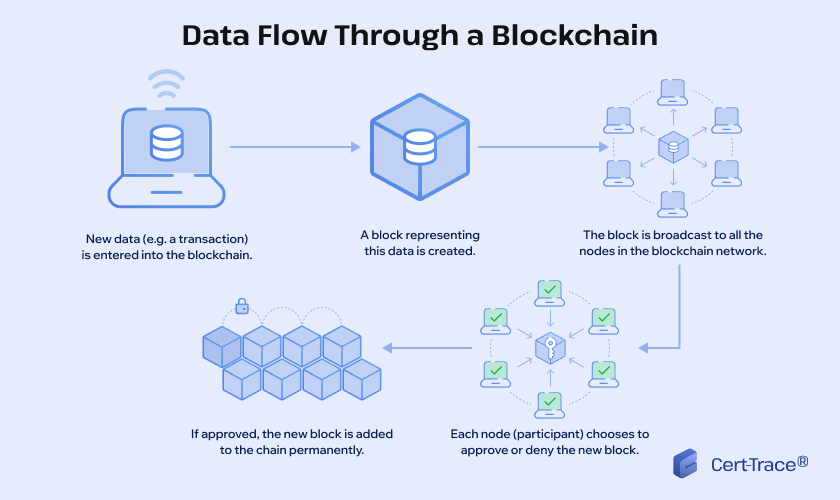Blockchain has already revolutionized the financial industry but how much more of the way we live and work can be improved by utilizing the abilities of this technology? One example of this is how it can change the way we store our files, moving us from the imperfect solution of cloud storage into a brave new world.
This is just one of several emerging blockchain trends and and in this blog we’ll explain how this can work and what blockchain’s impact on data storage can be, including asking whether blockchain really can replace a traditional database.
Blockchain data basics: on-chain data vs. off-chain data
Before we get into how blockchain data storage works, we should take a step back and explain how blockchain data actually works. One of the selling points of blockchain is that it offers a permanent, uneditable digital record, which makes it ideal for its main uses so far – as currency and as art.
There are two general types of data associated with a blockchain. The first is on-chain data, the log of a transaction like a purchase which is stored across various decentralised nodes around the world. Off-chain data is any other data related to the transaction, like images, descriptions, etc, which is stored elsewhere.
Ways data flows through a blockchain
Blockchain uses distributed ledger technology, hosting a decentralized database of information about transactions as a chain of interconnected blocks (hence the name).
In a transaction, there’s a typical process where the data is entered into one of these blocks which is stored across multiple machines, all of which need to match for it to be considered valid. These blocks, when full, are encrypted, storing that data securely, which is one major advantage of blockchain data storage.

Can blockchain replace a traditional database?
But does this mean that blockchain is ready to replace the traditional kinds of databases that we all currently use? Both effectively perform the same function, but in different ways and with different advantages and disadvantages to each.
For example, the immutability of blockchain means that the data stored can’t be edited, which might be ideal for some kinds of data, but not for others where editing is required. There are also complications associated with blockchains that result in needing underlying databases to be involved, especially when larger files are involved.
So the answer seems to be that blockchain may or may not be able to replace your traditional database, depending on your circumstances, requirements, and the kind (and size) of data you want to store.
Blockchain storage vs. cloud storage
Today, cloud storage is big business, generating over $400 billion in 2022. Businesses have made the switch from bulky databanks in their offices to the cloud, in search of more efficient ways of storing data and making it accessible to their staff whenever and wherever they are.
But cloud storage isn’t perfect. Despite its airy name, it still represents a physical storage solution contained in a centralized location. This represents a storage risk because there needs to be a central entity that controls the access to these files, making them vulnerable to hackers.
With blockchain there is no such central entity because of the decentralized nature of the technology. This means there’s no single point of failure and if one node is attacked, the rest are still functioning normally, so blockchain is clearly a better choice for data security.
Also the way the data is sharded, stored and distributed in small chunks in blockchain adds to the security because anyone who could hack into the system could only access a fraction of it rather than the whole files and folders that they would find in traditional cloud storage.
The cloud also relies on third parties for security, which opens up further vulnerabilities, whereas this is not the case with blockchain file storage. There is also more transparency with blockchain, meaning that you can track how the data is being moved from one point to another, whereas cloud storage has no such transparency.
The immutability of blockchain storage also ensures that data can’t be tampered with, as well as providing a clear path of ownership and identity. It’s ideal for long-term archiving too, especially as the data can easily be restored in an audit-proof manner.
How is blockchain transforming cloud storage?
Those are all the reasons why blockchain as a database can be a better option than traditional cloud storage, but what if the two were combined? After all, there are certainly still advantages to cloud storage, particularly when it comes to its efficiency, so why not use blockchain to enhance your security and data privacy?
Blockchain database technology working with cloud storage is transforming the way we store files with this marriage of security and efficiency, enabling users to interact in a peer-to-peer decentralized network. This brings all the advantages mentioned above, plus potential cost savings, making it a win-win for businesses.
The future impact of blockchain on data storage
Blockchain may not longer be the new kid on the block when it comes to the digital world, but it is still an emerging technology that has a lot to offer both individuals and businesses.
You might never have considered a blockchain data center to replace your existing data center or cloud storage, but the possibilities are there for making huge efficiency gains as well as adding much-needed security against hacks and data breaches.
With Cert-Trace, you can archive your data safely in the world’s most secure cloud storage system, backed by blockchain, maintaining access to these files at any time. You’ll know that no-one else can alter or access your data as well as saving money and doing your bit for sustainability compared to traditional cloud storage.
Why not get in touch today to find out more about blockchain for data storage and how this perfect marriage of security and efficiency can work for you? Contact info@tracert.digital to find out more.
How useful was this post?
Click on a star to rate it!
Average rating 5 / 5. Vote count: 494
No votes so far! Be the first to rate this post.


